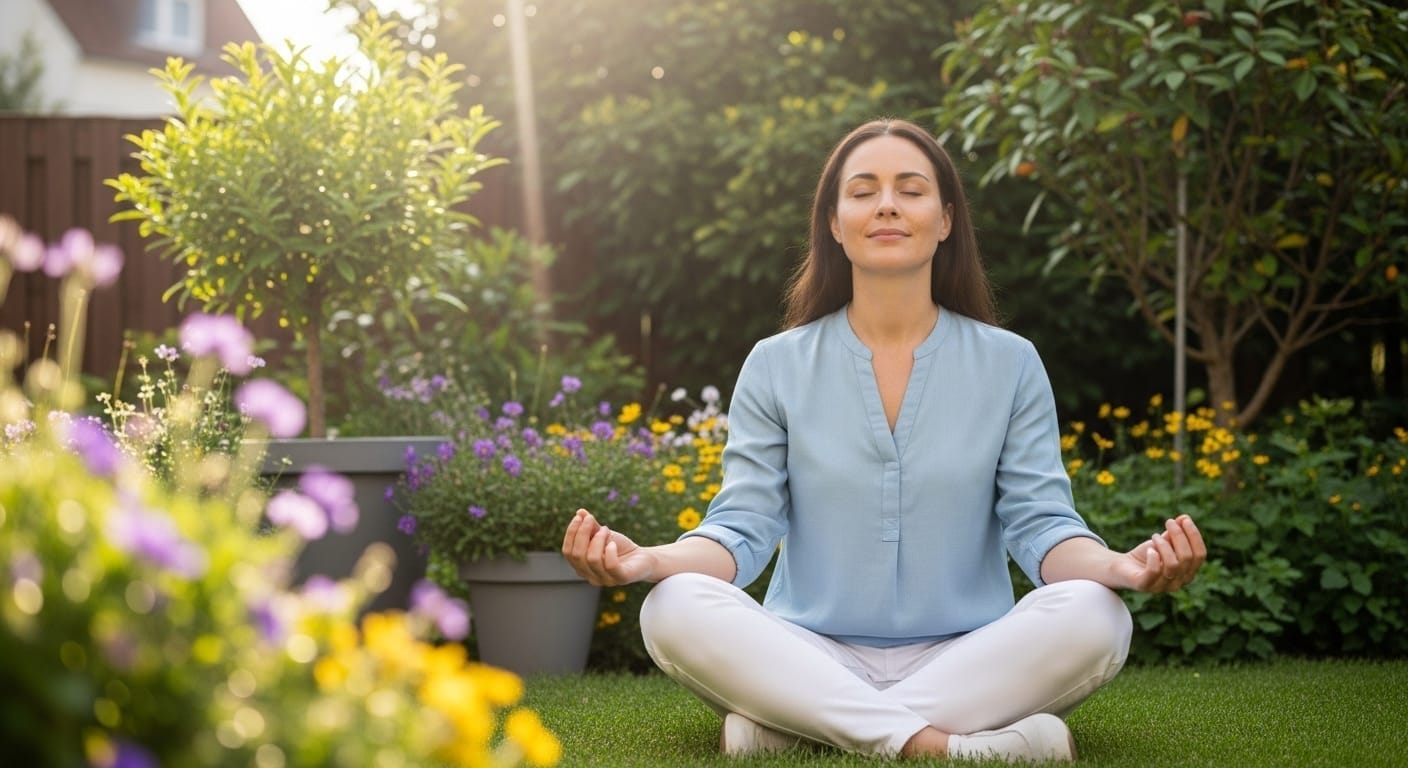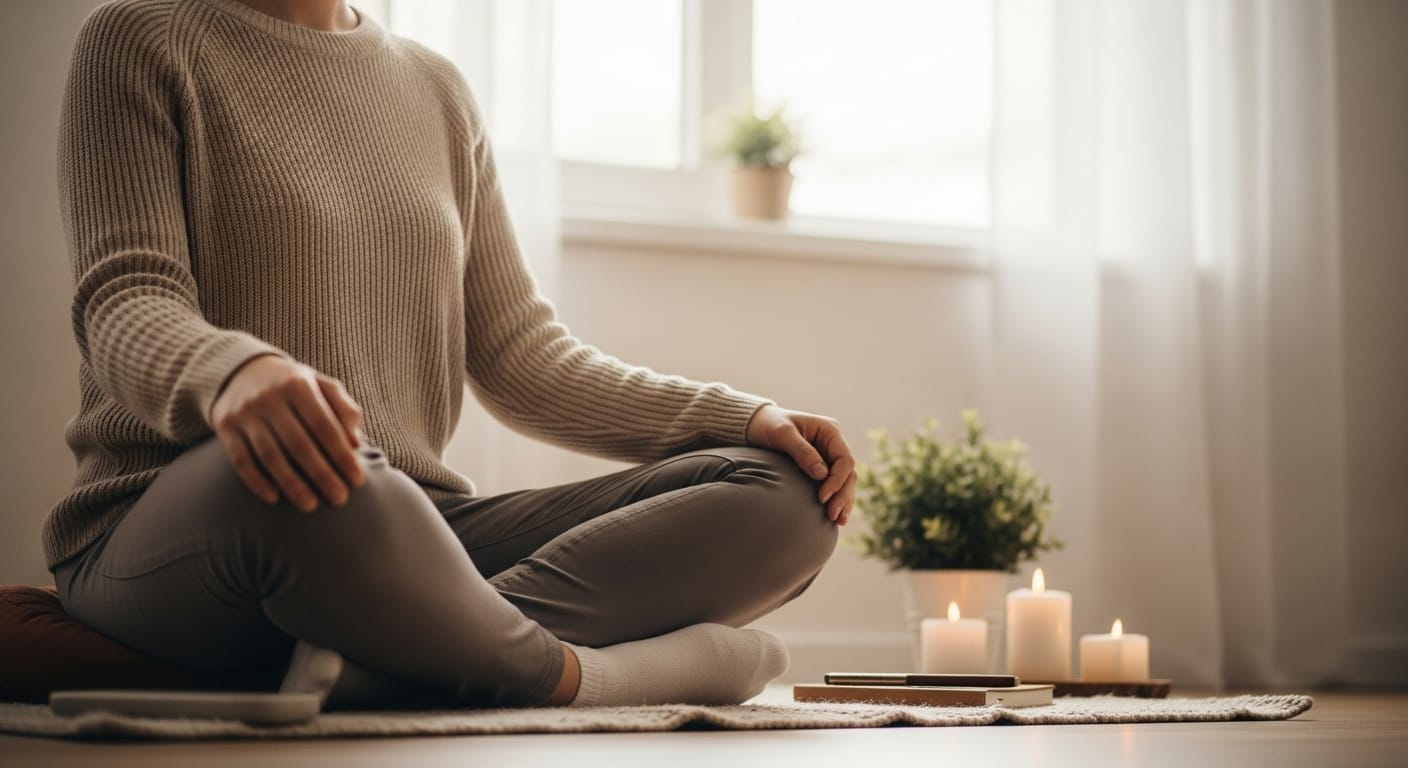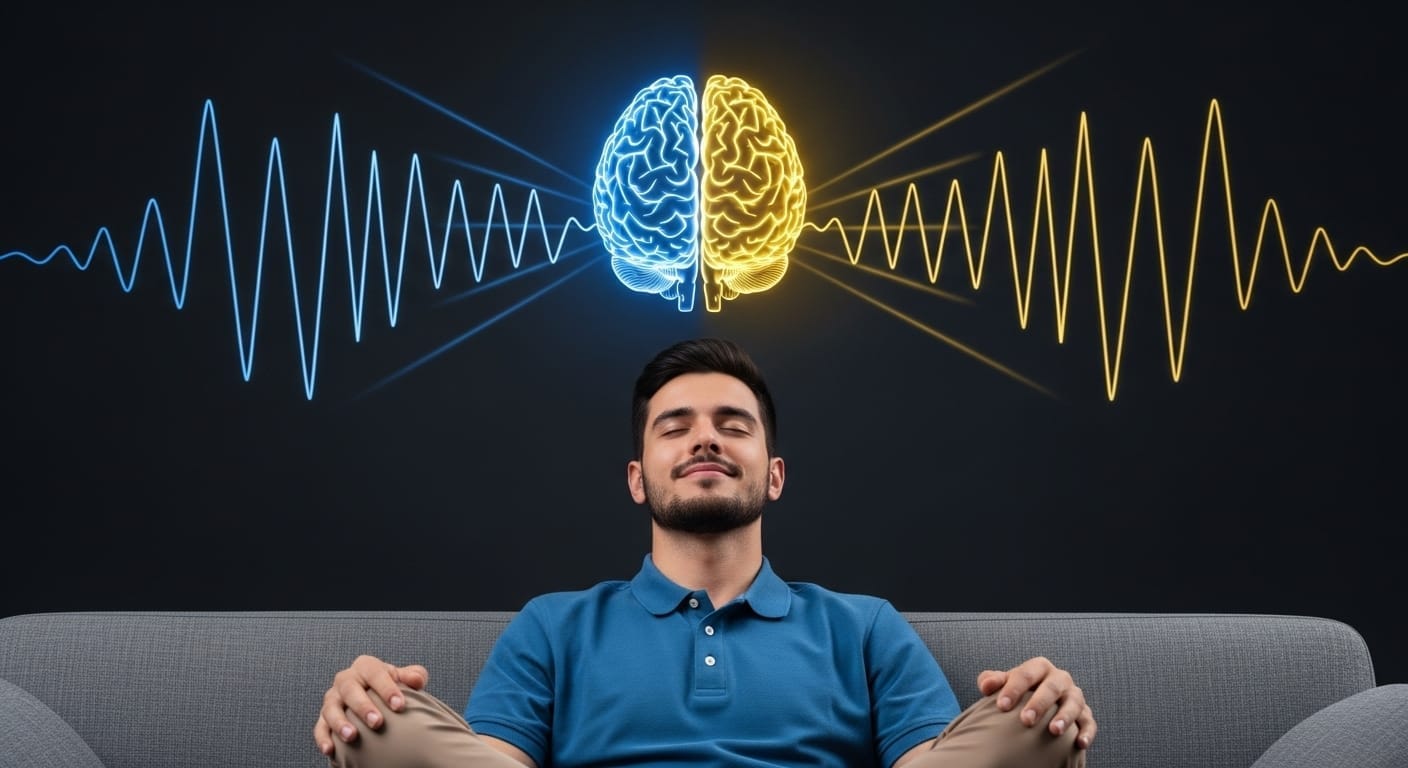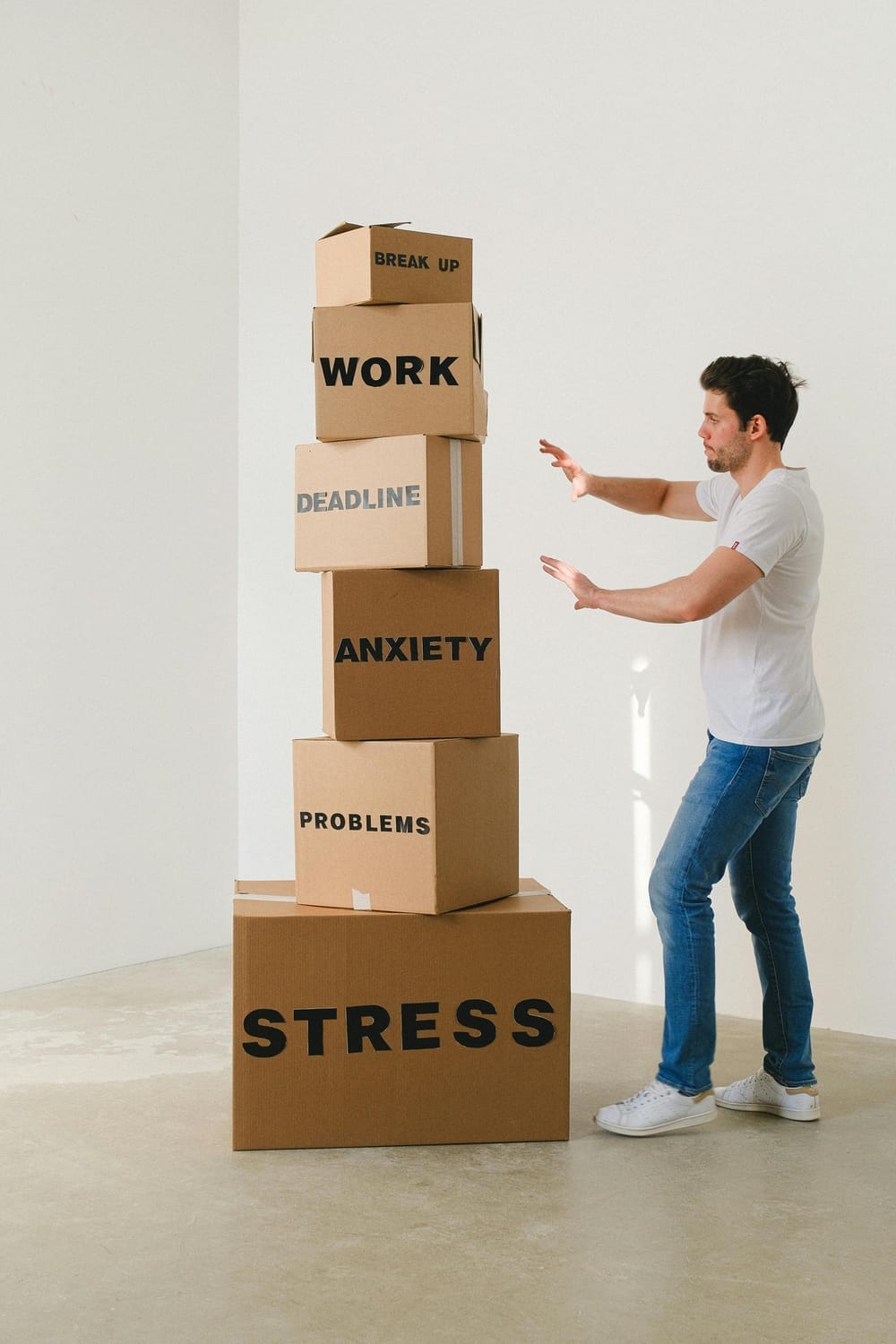

Mindful
Meditation
Unlocked
"Quiet the Mind. Unlock the
Present. Discover Mindfulness
That Transforms."
Discover the Benefits of Meditation: What is It?
You've probably heard about meditation and its many benefits. But, you might wonder what it really is. Meditation is a way to train your mind to focus. It helps you find calm and clarity.
Adding meditation to your daily life can greatly improve your well-being. It can lower stress and anxiety. It also helps you sleep better and feel happier.
Key Takeaways
Understand the concept of meditation and its significance.
Discover the benefits of incorporating meditation into your daily routine.
Learn how meditation can improve your overall well-being.
Explore the positive impact of meditation on stress and anxiety.
Find out how meditation can enhance your mental clarity and focus.
Understanding Meditation: A Comprehensive Overview

Meditation's history and philosophy are fascinating. It has been around for thousands of years. It has grown through many spiritual and cultural traditions.
The Ancient Origins of Meditation
Meditation started in ancient times. It was found in India, China, and Egypt. These early practices were linked to spiritual and religious beliefs.
They aimed to connect with a higher state or divine reality. The Vedas and Upanishads mention meditation early on.
The Purpose and Philosophy Behind Meditation
Meditation's philosophy varies by culture. But, it usually aims to change the mind. It seeks to understand oneself and the universe better.
It aims for inner peace, balance, and enlightenment. This is done by focusing the mind and changing consciousness. Its roots are in religious and spiritual teachings.
Modern Interpretations and Practices
Today, meditation has many forms. You can find mindfulness and transcendental meditation. There's also loving-kindness and body scan meditation.
Modern meditation helps with stress, mental health, and well-being. There's a wide range of techniques. This makes meditation available to more people.
What is Meditation? Defining the Practice
Meditation is a simple yet powerful practice. It trains your mind to reach a state of calm and focus. This practice has been around for thousands of years, evolving from ancient cultures into many forms.
The Core Elements of Meditation
Meditation has several key elements. Understanding these can help you see how deep and simple meditation is.
Awareness and Attention
A key part of meditation is growing awareness and attention. You focus your mind on something specific to clear your thoughts. This helps you concentrate better and stay focused.
Presence and Mindfulness
Being present and mindful are key to meditation. Being present means fully engaging with the moment, ignoring distractions. Mindfulness meditation helps you watch your thoughts and feelings without judgment, helping you understand yourself better.
Common Misconceptions About Meditation
Many people think meditation is only for religious folks or that it means stopping all thoughts. But meditation is for everyone, fitting many beliefs and goals. It's about watching your thoughts without getting caught up in them.
— Pema Chödrön
How Meditation Differs from Relaxation
Meditation and relaxation both aim to reduce stress and improve well-being. But they go about it differently. Relaxation focuses on calming the body, while meditation trains the mind for awareness and clarity. You can relax while meditating, but the main goal is mental awareness and peace.
| Aspect | Meditation | Relaxation |
|---|---|---|
| Primary Goal | Mental awareness and inner peace | Reducing stress and tension |
| Focus | Training the mind | Calming the body |
| Techniques | Mindfulness, concentration, awareness | Deep breathing, progressive muscle relaxation |
The Physical Benefits of Meditation
Meditation offers many physical benefits, from better heart health to a stronger immune system. It positively affects physical health in many ways. Adding meditation to your daily routine can be very beneficial.
Impact on Heart Health and Blood Pressure
Meditation helps the heart by lowering blood pressure and reducing heart disease risk. Studies show it can lower both systolic and diastolic blood pressure. This reduces heart strain and lowers the risk of heart problems.
Effects on Immune System Function
Meditation boosts the immune system by reducing inflammation and improving immune response. It increases antibody production and helps the body fight infections better. Meditation reduces stress, which is good for the immune system.
Meditation for Pain Management
Meditation is a valuable tool for managing pain. It helps people deal with chronic pain by focusing on the present. Meditation changes how we perceive pain, making it easier to handle.
Chronic Pain Relief Techniques
Techniques like mindfulness and body scan meditation are great for chronic pain. They help us become more aware of our bodies and reduce pain sensitivity. Mindfulness is essential in managing chronic pain.
Research on Pain Reduction
Studies show meditation can significantly reduce pain intensity. It lowers stress and promotes relaxation, which helps decrease pain perception. This makes meditation a good addition to pain management plans.
Mental and Emotional Benefits of Meditation
Meditation brings many mental and emotional benefits that can improve your life. It helps you stay balanced and healthy, making it easier to face life's challenges.
Stress Reduction and Anxiety Management
Meditation is great for reducing stress and anxiety. It calms your mind and nervous system. This makes you more relaxed and calm.
Mindfulness meditation is also good for anxiety and depression. It helps you stay in the moment, reducing worries and negative thoughts.
Improving Focus and Concentration
Meditation boosts your focus and concentration. It trains your mind to stay focused, improving your mental clarity and productivity. This is very helpful in today's busy world.
Enhancing Emotional Regulation and Resilience
Meditation also improves emotional regulation. It helps you think before acting, making you more resilient. Through meditation techniques, you become more aware of your emotions and thoughts.
Adding meditation to your daily routine can greatly improve your life. It leads to a more fulfilling and balanced existence.
Exploring Different Types of Meditation
As you dive into meditation, you'll find many types to suit your needs. Meditation offers various techniques to help you relax, focus better, or feel more well-rounded.
Mindfulness Meditation
Mindfulness meditation helps you stay in the moment. You might focus on your breath or body sensations. It teaches you to accept the now without judgment. Regular practice can lower stress, improve mood, and sharpen your mind.
Transcendental Meditation
Transcendental meditation uses a mantra to calm your mind. It's simple and effective, practiced for 20 minutes, twice a day. It's great for reducing stress and finding peace.
Loving-Kindness Meditation
Loving-kindness meditation, or Metta meditation, builds love and compassion. You repeat phrases to feel warmth and understanding. It helps you become more positive and empathetic.
Body Scan and Progressive Relaxation
Body scan and progressive relaxation relax your muscles. You tense and then relax each group. It's good for muscle relief, better sleep, and overall well-being.
The following table summarizes the key aspects of the meditation types discussed:
| Type of Meditation | Focus | Benefits |
|---|---|---|
| Mindfulness Meditation | Present moment awareness | Reduces stress, improves emotional regulation |
| Transcendental Meditation | Mantra-based relaxation | Reduces stress, promotes relaxation |
| Loving-Kindness Meditation | Cultivating love and compassion | Enhances positive mindset, empathy |
| Body Scan and Progressive Relaxation | Releasing physical tension | Reduces muscle strain, improves sleep |
How to Meditate: A Beginner's Guide

Starting your meditation journey means setting up the right space and learning key techniques. As a beginner, focus on the basics and grow your practice slowly.
Creating Your Meditation Space
The place where you meditate greatly affects your experience. A quiet, comfy, and tidy spot helps you concentrate and unwind.
Essential Elements for Comfort
For a cozy meditation spot, pick a meditation cushion or chair that supports your back. Keep the room at a nice temperature. Adding candles or plants can also make the space more calming.
Minimizing Distractions
Find a quiet spot away from busy areas in your home. Use noise-cancelling headphones or soft music to block out noise.
Posture and Breathing Techniques
Right posture and breathing are key for good meditation. You can sit, lie down, or walk while meditating. Just make sure you're comfy and relaxed.
Try focusing on your breath. Notice its natural flow. If your mind drifts, gently bring it back to your breath without judging.
Setting Realistic Expectations
As a beginner, have realistic goals for your meditation. Remember, your mind will wander, and that's normal. The goal is to be aware and patient.
Common Challenges for Beginners
Beginners often struggle to stay focused, feel restless, or get uncomfortable. Knowing these challenges helps you prepare and find solutions.
Tracking Your Progress
Keeping track of your progress can be motivating. Use a meditation journal to write about your experiences and feelings after each session. This helps you see your growth over time.
| Tips for Beginners | Description |
|---|---|
| Start Small | Begin with short sessions (5-10 minutes) and gradually increase the duration. |
| Be Consistent | Aim to meditate at the same time each day to establish a routine. |
| Use Guided Meditations | Guided meditations can help you stay focused and learn new techniques. |
Guided Meditation: Benefits and Approaches
Guided meditation is a special way to practice mindfulness and lower stress. It involves following a teacher or guide through a meditation session. They might have a specific theme or goal in mind.
What Makes Guided Meditation Different
Unlike solo meditation, guided meditation offers a structured experience. It's great for beginners or those who find it hard to quiet their minds. The guidance can be in audio recordings, videos, or live sessions with a teacher.
Types of Guided Meditations for Different Needs
Guided meditations vary to meet many needs and goals. Whether you want to relax, improve focus, or boost emotional well-being, there's a meditation for you.
Sleep and Relaxation Guides
Guided sleep meditations help those who struggle with sleep or seek deep relaxation. They use calming stories, music, or nature sounds to help you relax.
Focus and Productivity Guides
For better concentration or productivity, there are meditations designed to improve focus. These sessions help train your mind to stay focused and avoid distractions.
Finding the Right Guide for Your Practice
Finding the right guide is key with so many options. Think about what you want to achieve through meditation. Look for guides who specialize in those areas. Try different styles and tones until you find one that feels right for you.
Resources for Your Meditation Journey

As you keep meditating, the right tools can really help. Whether you're new or have been meditating for a while, the right resources can deepen your practice. They can also help you reach your goals.
Top Meditation Apps and Digital Tools
Today, many apps and tools support your meditation. They offer guided meditations, tracking, and community support. These can keep you focused on your practice.
Free vs. Premium Options
Many apps have both free and premium options. Free versions are great for starting, but premium offers more. This includes personalized plans and advanced tracking.
Features to Look For
When picking a meditation app, look at the interface and variety of meditations. Also, consider customization options. Some apps track your mood and offer personalized recommendations.
| App Name | Free Version | Premium Features |
|---|---|---|
| Headspace | Yes | Personalized plans, advanced tracking |
| Calm | Yes | Exclusive content, sleep stories |
| Insight Timer | Yes | Advanced statistics, customizable timer |
Books and Courses for Deepening Your Practice
Books and courses can deepen your meditation knowledge. They range from beginner guides to advanced teachings. There's a lot of information to support your journey.
Finding Meditation Communities and Teachers
Finding a meditation community or teacher can be very helpful. Look for local groups or online communities. They can motivate you and offer guidance.
Conclusion: Embracing Meditation in Your Life
Meditation is more than just a practice; it's a journey to better health and balance. Learning about meditation can change your life for the better. It helps reduce stress and anxiety and improves focus and emotional control.
There are many types of meditation and guided techniques to choose from. You can find the right fit for you. By using meditation apps, books, and courses, you can grow in your practice. Meditation is a way to improve your well-being and live more mindfully and compassionately.
FAQ
What is meditation, and how does it differ from relaxation?
Meditation is a way to train your mind to focus and relax. It makes you more aware of your thoughts and feelings. Relaxation is a state without tension, but meditation is more active. It involves paying attention and being aware.
What are the benefits of incorporating meditation into my daily routine?
Meditation can reduce stress and anxiety. It also improves focus and emotional control. It boosts well-being and can lower blood pressure and strengthen the immune system.
How do I get started with meditation, and what are some tips for beginners?
Start by finding a quiet, comfy spot. Pick a meditation method that feels right, like focusing on your breath. Begin with short sessions and be patient. Try different types of meditation to find what works for you.
What are some common challenges that people face when meditating, and how can I overcome them?
Challenges include quieting your mind and feeling restless. To overcome these, set realistic goals and be kind to yourself. Use meditation apps or guided meditations to help.
Can I use meditation apps to guide my practice, and what features should I look for?
Yes, meditation apps are great for beginners and experienced meditators. Look for guided meditations, customizable sessions, and tracking. Headspace and Calm are popular apps with free and premium content.
How can I deepen my meditation practice and continue to progress?
To deepen your practice, try different meditation types and attend retreats or workshops. Seek advice from experienced teachers or join meditation communities. Learn more through books and online courses for new insights and techniques
Stay Mindful
Get updates & free mental wellness tips.
Hi 👋
Hope you are doing okay, Just want to let you know,
Some links on this site are affiliate links. We may earn a small commission if you make a purchase — at no extra cost to you.
Understand Your Mind.
Try our quick quizzes to learn more about your mental health.
Check these out









